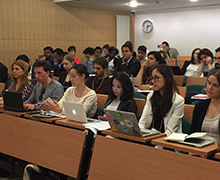news
Dr. Leonel Fernández Says Latin America is Moving Towards Regulation of Audiovisual Media
June 30, 2016
The President of Global Foundation for Democracy and Development (GFDD) and Fundación Global Democracia y Desarrollo (Funglode), and former president of the Dominican Republic, Dr. Leonel Fernández said that Latin America is advancing in the development of legislation to regulate the media.
Fernández, who is also the president of the EU-LAC Foundation, said that so far in Latin America there are only laws on print media, but with the arrival of the
Internet and the rise of digital media it has become necessary to create regulations for other types of media.
The Caribbean leader spoke during the roundtable discussion, "Media Reform Policies", an event that was organized by the Center of Global Communication Studies of the Annenberg School of Communication and the Programme in Comparative Media Law and Policy from Oxford University.
The former leader asked to what extent
international legal norms have a real influence on the policies of the media nationwide. "International standards come from Article 19 of the United Nations System, which provides the freedom of expression and dissemination of ideas without prior censorship. Latin America and the Caribbean countries are members of the UN, so we all have the same wording in our laws for freedom of expression," Fernández said.
"Then there is the OAS, the
Inter-American Court of Human Rights, where the same thought for freedom of expression is repeated" added the former head of state. He said that with the rise of the left to power in some countries in the region media turned into critics and strong tensions were generated. He said that these tensions then intensified because laws regulating the concentration of ownership and the allocation of frequencies in the electromagnetic spectrum were approved.
Fernández considered that the legislative challenge faced by the region is to differentiate regulation for
telecommunications, print media, electronic media (radio and TV), the Internet and social networks.
In that regard, he welcomed the contribution made by the Programme in Comparative Media Law and Policy at Oxford University and the Annenberg School of Communication, of the University of Pennsylvania in the United States.
In addition to Fernández, the group discussion involved Prince Monroe, Director of the Center for Global Communication Studies (CGCS)
from the Annenberg School for Communication, and Joan Barata Mir, Senior Advisor to the Representative of the Organization for Security and Co-operation in Europe (OSCE) for the Freedom of the Media, and Researcher at the Central European University in Spain.
After finishing his two-day agenda in England, the politician arrived Thursday to the city of Salamanca, Spain, where he was invited, as president of the EU-LAC Foundation, to give the closing speech at the eighth
annual CEISAL, an event organized by the Instituto Iberoamérica de la Universidad de Salamanca.
Related Link: http://leonelfernandez.com/







